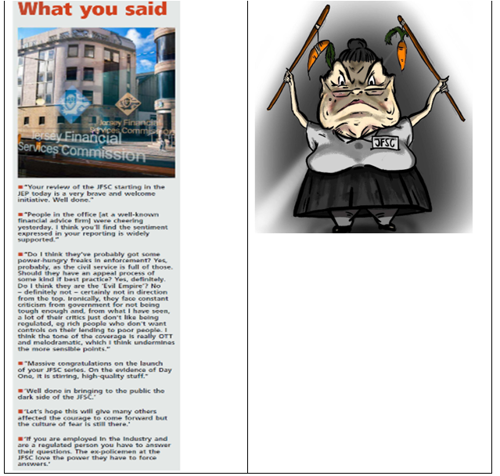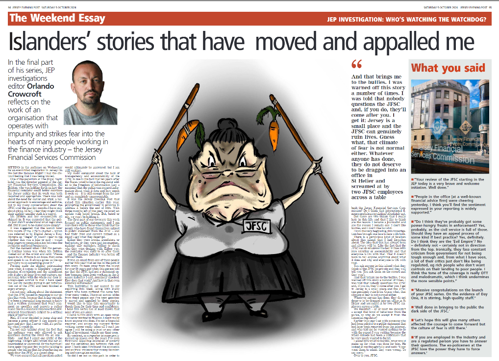
JEP DAY 3 JFSC EXPOSE – The Weekend Essay - Saturday 5 October 2024
07/10/2024
OVER the last three days, the JEP has probed the Jersey Financial Services Commission and the dysfunctional relationship that it has with the industry it is supposed to regulate.
This is what Orlando Crowcroft published in the weekend essay on Saturday 5 October 2024


SITTING in the audience on Wednesday for an event titled Regulation in Jersey: Do We Get the Balance Right? I had the distinct feeling that I was being trolled.
One of the panellists at The Royal Yacht hotel was the director general of the Jersey Financial Services Commission, Jill Britton, who was holding forth on how the financial regulator could better convince the Jersey public that its work was both required and appropriate. There was talk about the need for carrot and stick, a balanced approach to encourage and enforce, but in my many conversations about the JFSC over the past few months I have only about sticks. In fact, I fear they might thick their slightly smaller stick is a carrot.
Ms Britton and her co-panellists all chimed in. It was suggested that the public just didn’t understand what regulators did. Did it need to be stated more simply?
It was suggested that the launch later this month of the JFSC’s chatbot – which was referred to by Digital Jersey’s Tony Moretta as “Regie” (it wasn’t clear to me whether this was a joke or not) – would help improve communication between the regulator and local businesses.
But the moment when I felt the personal trolling began was when Ms Britton looked out at the crowd and said:
- “Please speak to us. If there is an issue, then come and speak to us. It always gives us the opportunity to do something about it.”
Putting aside the slightly patronising tone when it comes to Islanders’ comprehension of regulation and the significant role it plays in their lives and careers, my personal gripe with the whole our-door-is-always-open schtick is that I have spent the last six months trying to get information out of the JFSC and been blocked at every attempt.
I’m not only talking about the statement that the JFSC issued in response to our series this week, because that is fair enough.
I’ve been a journalist long enough to know that a written statement that won’t comment on specifics and parrots a rather bland line is a standard response from government departments subject to a critical piece of journalism.
Hell, if I ever decided to jump ship and become a press officer (I can assure you here and now that I never will), it’s probably what I would do.
I’m not only talking about the fact that the audience were only allowed to ask questions during the event via an app – Slido – and that I asked one (right at the beginning, I might add) which was not acknowledged or answered. Or the fact that I have spent the past few months talking to people who tell me that far from having an open door the JFSC is a closed shop.
We were assured that all questions asked would ultimately be answered: but I am still waiting.
My main complaint about the lack of transparency and accountability of the JFSC is due to the fact that ten years after the States voted to have the regulator added to the Freedom of Information Law – meaning that the public can request information about what it does and how much it costs us – it is still exempt from the law and so, completely unaccountable.
It was the Jersey Evening Post that raised this situation earlier this year, prompting the government to promise to address it before the end of 2024. With three months left of the year, we await an update with bated breath. But, bated or not, we won’t be holding it.
The first part of our coverage this week focused on public statements, and I am sure there will be those who think that the people who have found themselves subject to public statement from the JFSC – and had their lives and careers ruined as a result – got what they deserved.
Either they were crooks, fraudsters, or bad actors, or they were just incompetent, making silly mistakes, failing to check who they were dealing with. Either way, the regulator was right to go after them – and the finance industry was better off without them.
It was an email from one of these people earlier this year that set me on the path of this story. I’d been away from the Island for over 15 years and when this person told me that the JFSC had put a statement online banning them from working in the finance industry I said, genuinely shocked: How does that work? And how is that even remotely enforceable? This individual is not named in my reporting this week, along with many others who have suffered the same fate.
Over many weeks, I have sat across tables from these people and I’ve been genuinely moved and appalled by their stories.
I would like to take this opportunity to thank them for their time and confidence.
I hope this series has at least shown that none of you are alone.
I came to this story with an open mind.
I’ve never worked in finance; I don’t really know anyone who does. I’m not a financial reporter, and unless my nascent fiction writing career really takes off I can’t imagine I will be using a trust or any other kind of investment vehicle any time soon.
By contrast, as a reporter in some pretty messed-up places over the years I’ve seen first-hand appalling examples of poverty and the egregious gap between rich and poor. I have seen first-hand the economic and political violence that money laundering and corruption enables.
So did I set out on this path in order to bash the Jersey Financial Services Commission? Do I think that international finance needs less regulation? Absolutely not.
But there are two things that I really hate in this life, and that I like to think are the reason I became a journalist and are the reason I remain one: I don’t like bullies, and I don’t like bullshit.
From the very beginning, this investigation has brought me face to face with both.
There is a pernicious kind of fatalism about this island that I had forgotten about. The idea that this has always been and always will be. Like the fact that the JFSC can do whatever the hell it likes with zero scrutiny or accountability and that everyone is OK with that. That it doesn’t have to tell anyone anything about what it does and why and everyone is OK with that.
You ask anyone in this island what they think of the JFSC in private and they will tell you. You ask them on the record and they won’t.
And that brings me to the bullies. I was warned off this story a number of times. I was told that nobody questions the JFSC and, if you do, they’ll come after you. I get it: Jersey is a small place and the JFSC can genuinely ruin lives. Guess what, that climate of fear is not normal either.
Whatever anyone has done, they do not deserve to be dragged into an office in St Helier and screamed at by two JFSC employees across a table.
We wouldn’t – or at least we shouldn’t – accept that kind of behaviour from the police, so why do we accept it from the financial regulator? Earlier this year I sat with someone who had been subject to a public statement that had later been removed from the internet, and who told me he wanted nothing to do with the report I was writing because the whole episode had been a nightmare that he very much wanted to forget.
I asked him what he wanted, what would make up for what was done for him. He looked at me thoughtfully and said: “I just want them to admit they were wrong. To say sorry.”
Over to you, JFSC.


The Team
Meet the team of industry experts behind Comsure
Find out moreLatest News
Keep up to date with the very latest news from Comsure
Find out moreGallery
View our latest imagery from our news and work
Find out moreContact
Think we can help you and your business? Chat to us today
Get In TouchNews Disclaimer
As well as owning and publishing Comsure's copyrighted works, Comsure wishes to use the copyright-protected works of others. To do so, Comsure is applying for exemptions in the UK copyright law. There are certain very specific situations where Comsure is permitted to do so without seeking permission from the owner. These exemptions are in the copyright sections of the Copyright, Designs and Patents Act 1988 (as amended)[www.gov.UK/government/publications/copyright-acts-and-related-laws]. Many situations allow for Comsure to apply for exemptions. These include 1] Non-commercial research and private study, 2] Criticism, review and reporting of current events, 3] the copying of works in any medium as long as the use is to illustrate a point. 4] no posting is for commercial purposes [payment]. (for a full list of exemptions, please read here www.gov.uk/guidance/exceptions-to-copyright]. Concerning the exceptions, Comsure will acknowledge the work of the source author by providing a link to the source material. Comsure claims no ownership of non-Comsure content. The non-Comsure articles posted on the Comsure website are deemed important, relevant, and newsworthy to a Comsure audience (e.g. regulated financial services and professional firms [DNFSBs]). Comsure does not wish to take any credit for the publication, and the publication can be read in full in its original form if you click the articles link that always accompanies the news item. Also, Comsure does not seek any payment for highlighting these important articles. If you want any article removed, Comsure will automatically do so on a reasonable request if you email info@comsuregroup.com.


